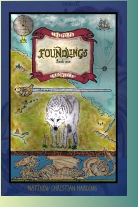
Cry for the Moon by William Woodall, a Review
Published by Jeremiah Press (self-published), 2009, 235 pages.
Genre: Middle-grade Christian horror (mild)
The protagonist of this book is 12-year-old Zach. He and his younger sister live with their parents and a grandmother in woods in East Tennessee. Zach and the sister are just regular kids, but the adults in the family are werewolves. What are werewolves? They are people who get weird on the full moon, growing claws and hunting game in a very beast-like fashion. But still people. How do they get to be werewolves? They accept a curse by going through a ceremony during the Harvest moon and then making a kill on the next full moon.
Somehow Zach doesn’t like any of this. His family is setting him up to be a werewolf too: his grandmother does the Harvest Moon ceremony on him (after making him drowsy). All he has to do is go on a hunt on the following full moon with them, and … well, he will have none of it.
He escapes and flees to find his uncle Justin, who lives in Texas and whom he has never met. He tells the story in the first person, and we get to know him as a likable kid. His flight is an adventure that takes up most of the book–he seeks to avoid detection as a runaway, and so rakes yards and does odd jobs to earn bus money and money for food. It’s a tough life, being homeless. Eventually, he gets to Uncle Justin. When he finds Uncle Justin, how is he received? I won’t spoil the story for you. But I’ll tell you that Justin turns out to be a Christian.
What do I think? This book opens with a pretty disgusting portrayal of the grandmother-as-werewolf taking apart a rabbit. I think that’s a put-off. But since it’s about werewolves and all, maybe not too much. Hey, they’re evil, right?
The book lacks a constant antagonist. A really good story usually has an antagonist which provides difficulties and conflicts all the way to the end. This story has the werewolves as antagonists briefly, and then the tale becomes the quest for Justin.
From a Christian perspective, what I wonder about is the apparent inherent goodness of Zach. He is tempted to steal something, a map, but doesn’t do it. Stealing to eat would be a mighty temptation to someone with hardly any money, just enough to buy some junk cupcakes for his dinner. Eventually, when he gets to Justin’s empty house, he checks out the place and even finds where Justin keeps a spare $400, but he doesn’t even seem tempted to take it.
So, while it’s a nice story of the redemption of Zach from an evil family, it might have been more realistic if he had also been obviously redeemed from his inherently evil self (as all Christians are). Also missing from this story is the usual suspense and fright associated with the horror genre. No big loss as far as I am concerned!
Aside from the opening, I enjoyed reading the book. We get to know and like Zach, who has a unique voice.–Phyllis Wheeler


